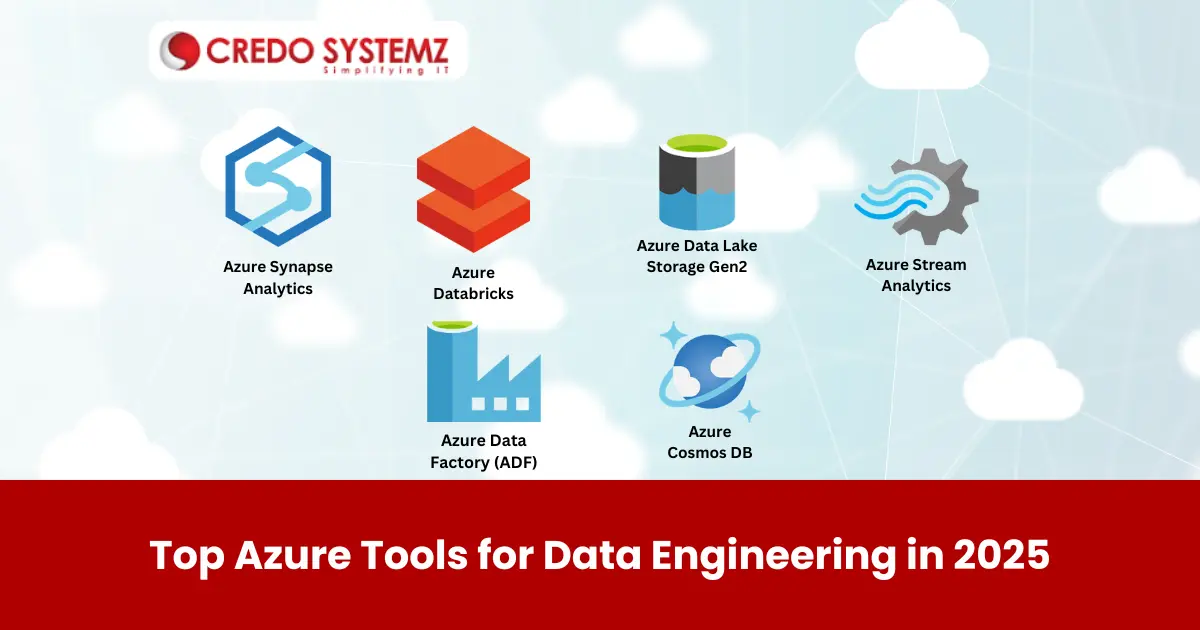
Introduction
As data continues to grow rapidly, data engineering is the critical discipline to manage, transform, and analyze data effectively. Azure offers a robust suite of services to help data engineers build scalable, efficient, and secure data pipelines. In 2025, the Azure tools will shape the future of data engineering.
Top Azure tools for data engineering in 2025
- Azure Data Factory (ADF)
- Azure Synapse Analytics
- Azure Databricks
- Azure Data Lake Storage Gen2
- Azure Stream Analytics
- Azure Cosmos DB
Azure Data Factory (ADF)
- Azure Data Factory (ADF)
- Azure Synapse Analytics
- Azure Databricks
- Azure Data Lake Storage Gen2
- Azure Stream Analytics
- Azure Cosmos DB
Azure Data Factory (ADF)
Azure Data Factory is a fully managed cloud-based data integration service to build, orchestrate, and automate data pipelines across diverse data sources. It automates end-to-end data integration and transformation processes.
Key features
- Low-Code and no-Code pipelines with drag-and-drop UI and data flow transformations.
- Hybrid data integration to connect on-premises and cloud-based data sources.
- Integration with Azure Synapse Analytics for Seamless movement and transformation of data for advanced analytics.
Use Cases
- Data migration between various storage services.
- Automating daily ETL workflows.
- Real-time data ingestion and transformation.
Azure Synapse Analytics
Azure Synapse Analytics is a comprehensive analytics service that brings together big data and data warehousing in a unified platform. It enables organizations to analyse vast amounts of data with querying, data exploring and visualization.
Key Features
Use cases:
- Enterprise data warehousing.
- Real-time analytics and reporting.
- Real-time data processing, business intelligence.
- Combining structured and unstructured data for insights.
Azure Databricks
Azure Databricks is an Apache Spark-based analytics service for large-scale data engineering, machine learning, data science, and analytics.
Key Features
- Collaborative workspace for real time collaboration that supports Python, Scala, R, and SQL.
- Auto-Scaling Clusters to Manage Spark clusters and optimize performance with dynamic scaling.
- Delta Lake ensures reliability, scalability, and consistency for big data processing.
Use Cases:
- ETL and data preparation for analytics.
- Real-time streaming data pipelines.
- Building machine learning models with large datasets.
Azure Data Lake Storage Gen2
Azure Data Lake Storage Gen2 is a data storage service designed for big data analytics. It combines the power of a hierarchical file system with blob storage for large-scale data.
Key Features:
- Scalability to handle petabytes of data and billions of files with high performance.
- Hierarchical Namespace for efficient file organization, processing and access that supports file and folder structures.
- Security by Integrating with Azure Active Directory and fine-grained access controls that supports encryption and compliance.
Use Cases:
- Storage for big data analytics workloads.
- Data lake house for unified Analytics.
- Staging data for Spark and Hadoop jobs.
- Data archiving with secure access.
Azure Stream Analytics
Azure Stream Analytics is a real-time analytics service for processing data streams from IoT devices, sensors, and applications.
Key Features:
- Real-Time Insights and data processing with Low-latency and windowing functions.
- SQL-Like Query Language to filter, transform and analyze data, which allows complex event processing.
- Integration Works seamlessly with IoT Hub, Event Hubs, and Power BI.
Use Cases:
- Real-time anomaly detection.
- IoT data analysis.
- Fraud detection in real time.
- Track vehicle data.
- Processing log and telemetry data for monitoring.
Azure Cosmos DB
Azure Cosmos DB is a globally distributed NoSQL database service designed for large-scale applications that requires low-latency and high availability.
Key Features:
Multi-Model Support works with document, key-value, graph, and column data. Global Distribution of Data replication across multiple Azure regions to achieve high availability. Guaranteed Low Latency at global scale with Sub-10-millisecond read and write operations.
Use Cases:
- Storing and querying IoT data at scale.
- Building real-time personalized applications.
- Gaming, retail and e- commerce.
- Globally distributed data stores for high-availability apps.
Want to know more about the course curriculum, career counseling, or video references? Just ping us on WhatsApp!
Conclusion
Finally, Azure provides a comprehensive toolkit for data engineers which enables seamless data integration, processing, governance, and analytics. These tools help organizations to streamline their data workflows, make real-time decisions, and scale effortlessly. By leveraging tools like Azure Data Factory, Synapse Analytics, and Azure Databricks, data engineers can stay ahead in an increasingly data-driven world. To master Azure and Azure tools, Credo System provides Azure Training in Chennai for data engineers!
Join Credo Systemz Software Courses in Chennai at Credo Systemz OMR, Credo Systemz Velachery to kick-start or uplift your career path.
